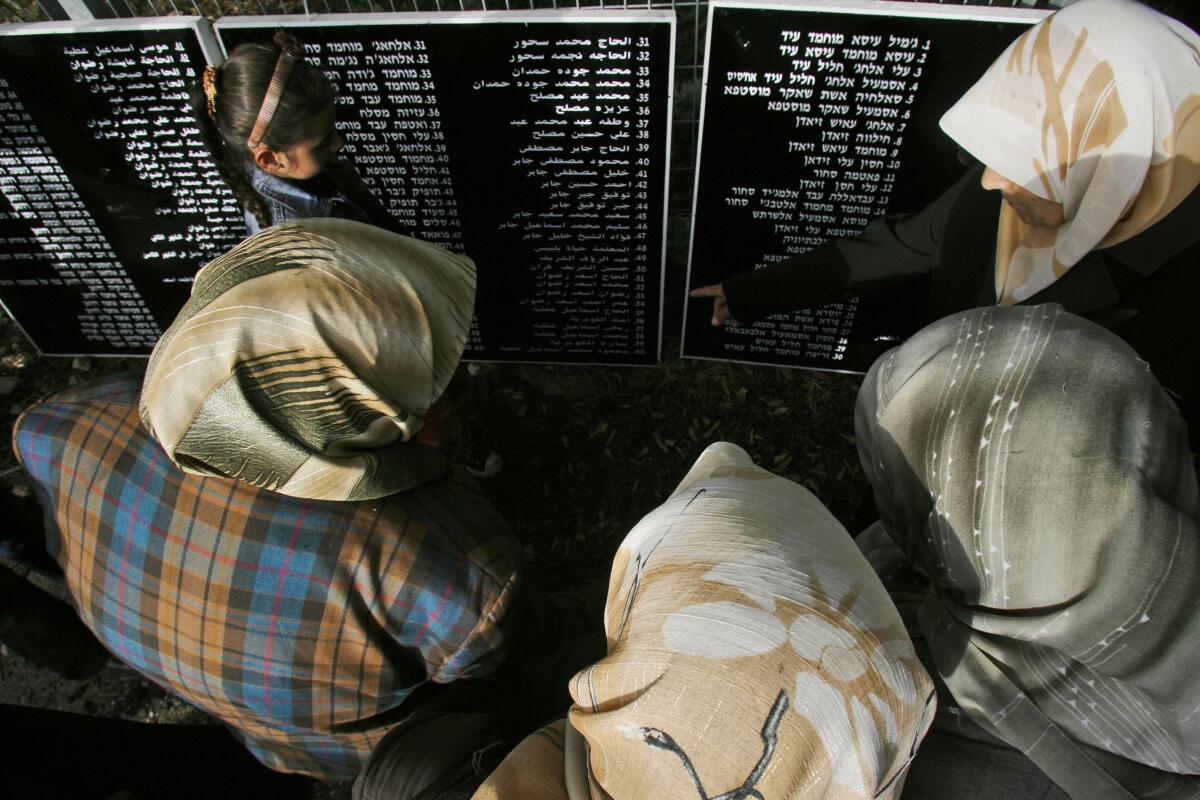Column: Seven decades later, the history of the Israeli-Palestinian conflict is still being kept secret

I once snuck into the abandoned village of Deir Yassin, just a few miles outside Jerusalem. The village had been the site 50 years earlier of a notorious massacre during the founding of the state of Israel. More than 100 Palestinian Arabs were killed there, including women, children and elderly civilians.
By the time I made my visit, as a reporter in Israel in the late 1990s, the village no longer existed officially; it had been stricken from the maps. The remaining houses were off-limits to the public; they were mostly within the closed confines of the sprawling Kfar Shaul Mental Health Center campus.
I made my way past the gates on foot, and I found the old mosque and a tomb and some houses still mostly intact. I talked to one Palestinian survivor who described fleeing across the hills as more than a dozen of his relatives were killed by members of right-wing paramilitary groups fighting to create a Jewish state.
Other than that, the original residents were long dead or gone.
Still, the name Deir Yassin remained — and remains today — a potent symbol, and the killings that took place on April 9, 1948, have been the subject of endless dispute among historians. How many Palestinian villagers were killed? Who ordered the atrocities and who was complicit? What does it tell us, if anything, about the origins of the Palestinian refugee crisis and the Israeli-Palestinian conflict?
Unfortunately, even today — seven decades after the killings — the Israeli government won’t release key files on Deir Yassin. The disappearance of the village behind the gates of a psychiatric hospital serves as an apt metaphor for the continued secrecy surrounding the events of that day.
According to a recent study by the Akevot Institute for Israeli-Palestinian Conflict Research, it is not just Deir Yassin documents and photographs that have been withheld from public view, but also other files on military operations that involved accusations of human rights violations and atrocities against the Arab population. The Akevot study focuses on the role of the Ministerial Committee on the Matter of Permission to Examine Classified Archival Material — an Orwellian name because in fact the government committee often seems dedicated to not extending permission.
The secret material dates mostly from around the time of Israel’s independence in 1948. According to an article in Ha’aretz, some of it deals with the alleged “deportation of Arabs” or the “destruction of Arab villages.” There are reports on alleged killings, atrocities, acts of criminality and human rights violations.
Why have these files remained secret for so long? The government would have you believe that their release would threaten national security, foreign affairs or privacy, but in fact there seem to be other motivations at work. As one state archivist wrote in describing documents that were not released: “The contents are unpleasant.” In 2000, Israel’s attorney general ruled with regard to Deir Yassin that there was no need to declassify documents “relating to this painful and emotionally charged affair.” Ministerial committee minutes from that same year suggest that the decision to extend classification was made out of concern for “the image and perception of the state of Israel.”
In other words, it has been an ongoing, seven-decade PR campaign.
“The state, through its government archives, is trying to control the official story, the narrative,” says Lior Yavne, executive director of Akevot. “Not only can’t historians do their work, but it becomes difficult to have fact-based political discussions when the root causes of the conflict and its aftermath are being blurred by secrecy.”
For Israelis and Palestinians, it sometimes feels as if history is ever-present, hanging heavily over each day of the conflict. The past — including 1948, but also going back beyond the British Mandate, beyond the Ottoman Empire all the way to biblical times — never seems far away. Just last week, Ben-Zion Cohen, commander of the pre-state paramilitary fighters who entered Deir Yassin that day in April 1948, died at age 94. He never expressed remorse for his role in the massacre, according to his obituary.
It’s easy enough to see why Israel is not eager to publicize documents that might be inflammatory or could increase hostility to Zionism. Over the years, the government has released many pages of military and security documents — but it keeps millions more pages of records and files locked away, out of the hands of scholars, according to Yavne. In some cases it has declassified and then resealed documents. In other cases it has extended the legal classification period.
Burying unpleasant history is no strategy for a democracy. Israel prides itself on being the freest country in the region; if so, it should be transparent and honest about its past. Just as the United States must confront the statues of Confederate generals and politicians around the country, Israel must face up to its own origin story.
I have no interest in seeing Israel delegitimized. I’ve long been a supporter of a two-state solution and would love to see a safe, robust and dynamic Israel thriving alongside an independent Palestinian state. I would be the first to acknowledge that both sides in the conflict are guilty of unacceptable violence against innocents.
But a country ought to face its history honestly — its faults as well as its strengths. To that end, historians need access to the raw material that tells the full story.
More to Read
A cure for the common opinion
Get thought-provoking perspectives with our weekly newsletter.
You may occasionally receive promotional content from the Los Angeles Times.











